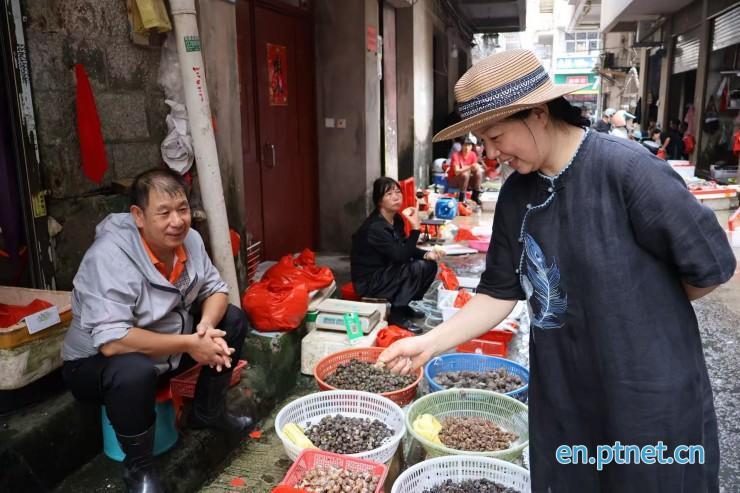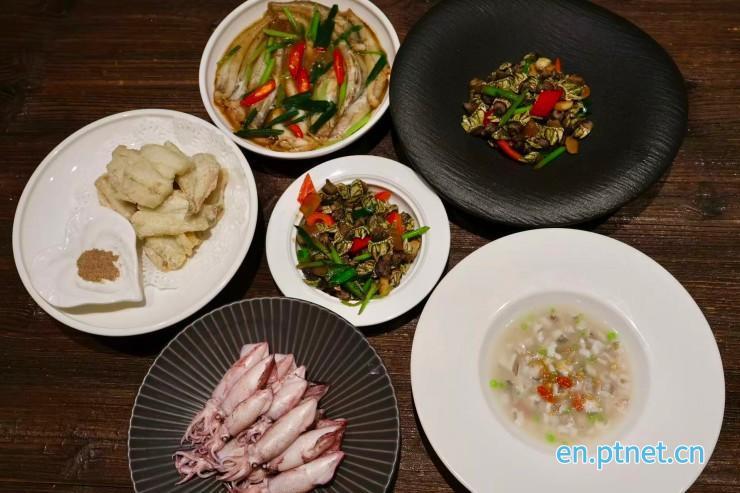Living off the sea: Keeping Pingtan's food culture alive
en.ptnet.cn | Updated:2025-09-28 | Lin Kongbo, Stephanie
Qiu Se (rightmost) selecting "bijia" (goose barnacles) at the seafood market
Pingtan, a coastal county in southeast China's Fujian Province celebrated for its abundant maritime harvests and time-honored "living off the sea" culture, draws food lovers to its bustling markets where the day's catch arrives straight from fishing boats. Recently, a journalist from Pingtan CMC joined Qiu Se—owner of Pingtan's Qiushe Food Space, a beloved local culinary spot—to wander Shangpu Seafood Market, a historic hub in the old town, learning to pick seasonal seafood and prepare home-style coastal dishes.
As early morning light spilled over the market, narrow lanes lined with wooden stalls hummed with energy. The air carried a sharp, fresh saltiness, and vendors—mostly local fishermen who set out their catch right after docking—called out to passersby. "We sell only what we haul in that morning," one fisherman said, gesturing to a crate of wriggling squid. "Once it's gone, we close up—so you gotta come early for the best stuff."
Qiu Se, with years of experience turning fresh seafood into simple, flavorful meals, shared her go-to tips for spotting quality. For "xiaoguan" (rocket squid), she held up a specimen and explained: "Look at the eyes—they need to be bulging and shiny. If they're dull, the squid's not fresh. And when you cook it, fresh ones stay tight, not mushy." For stone crabs, she pressed the sides of a crab's belly gently: "Hard here means it's packed with meat. It's not as well-known as other crabs, but it has a sweet, clean taste you can't beat." For hairtail fish, she pointed to the silver sheen on the skin: "When it's fresh, this silvery coating doesn't rub off as easily. And pick ones wider than three fingers—thicker meat cooks better."
She also offered general rules for seafood shopping. "Live is always top," Qiu Se said, prodding a tank of shrimp. "Tap them—if they jump or move fast, they're good. For dead seafood, press the flesh—firm and springy means it's fresh. And a heavier fish of the same size is juicier and more flavorful." For those on a budget, she noted frozen options: "Freezing keeps most nutrients, and it's cheaper. Just know it might have more water, and the texture gets a little softer after thawing."

From market to table: Qiu Se cooks a table of homestyle seafood dishes
Later, Qiu Se demonstrated five easy, delicious dishes using the day's picks. For steamed "longtouyu" (soft-shelled fish), she laid a cleaned fish on a plate with ginger and green onions: "No need for fancy seasonings—just a little soy sauce and steam until it's just done. That way, you taste the fish's natural sweetness." For fried longtouyu slices, she coated the fish in cornstarch and dropped it into hot oil: "Golden and crispy, then sprinkle some salt and pepper—great for snacks or with rice."
For blanched rocket squid, she dropped the squid into boiling water for a few seconds: "Don't overcook it—tough squid ruins everything. Dip it in soy sauce and wasabi, simple as that." For stir-fried "bijia" (goose barnacles), she tossed them in a wok with garlic and chili: "High heat, fast stir—cooks in a minute. Add a splash of rice wine, and it's done. This seals in the flavor." Her most creative dish, taro puree with longtouyu soup, mixed mashed steamed taro with diced fish in a thickened broth: "Pour the hot soup over the taro—warm and creamy. Sprinkle some fried green onions, and it's like a hug in a bowl."
As she stirred the soup, Qiu Se talked about why seafood matters to her. "I grew up eating this every day with my family," she said, smiling. "Cooking these dishes brings back those memories. When I make something new, like this taro soup, and it works? It makes me happy—like I'm keeping our way of eating alive."
By midday, the market had quieted, most stalls emptying out. For Pingtan locals, a trip to Shangpu isn't just about buying food—it's a daily routine, a way to stay connected to the sea that shapes their lives.

 Fujian Public Security Registration Code: 35012802000271
Fujian Public Security Registration Code: 35012802000271